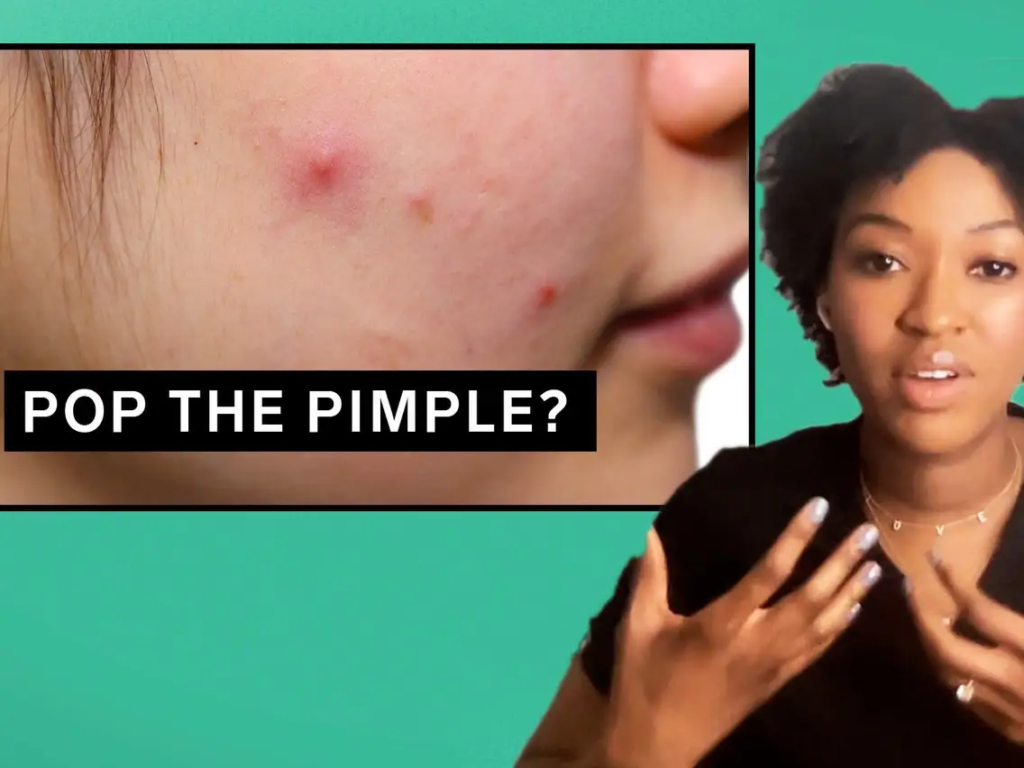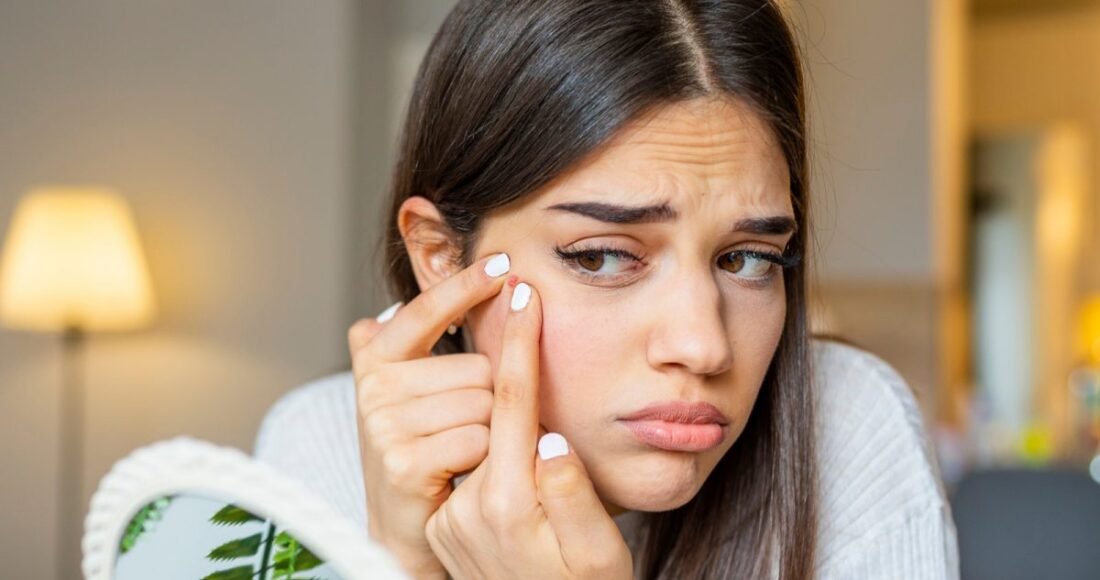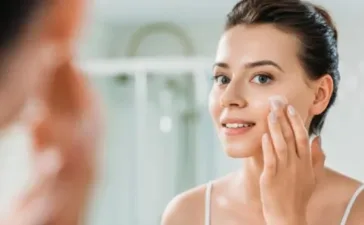For many people, acne and pimples are synonymous, however, this is far from the truth. Contrary to popular belief, these two skin conditions have distinct differences in their causes, symptoms, and treatments. In this blog post, we’ll debunk the myth that acne and pimples are the same things and explore the differences between the two.

What is acne?
Acne is a skin condition that occurs when hair follicles become clogged with oil and dead skin cells. This results in the appearance of whiteheads, blackheads, and pimples on the skin. Acne is most common in teenagers, but it can also affect people of all ages. It is a chronic condition that can be difficult to treat, and it can lead to scarring and emotional distress if left untreated. Acne can appear on the face, neck, chest, back, and shoulders. It is caused by a combination of factors, including hormonal changes, genetics, and lifestyle factors such as diet and stress. There are various treatment options available, including topical and oral medications, but it is important to seek professional advice to determine the best course of action for your individual situation.

What is a pimple?
A pimple, also known as a zit, is a small, inflamed bump on the skin. Pimples occur when the pores on your skin become clogged with oil, dead skin cells, and bacteria. This can happen when your body produces too much oil, causing the pores to become blocked. When bacteria enter the blocked pore, it causes inflammation, which results in a pimple. Pimples can range in size and severity, from small whiteheads to large, painful cysts. While pimples can be frustrating and unsightly, they are not a serious health concern. However, it’s important not to pop or pick at pimples, as this can lead to scarring and further infection.
So, what’s the difference?
Acne and pimples are often used interchangeably, but they are not the same thing. While both can be a nuisance to deal with, they have different causes and characteristics. Acne is a chronic skin condition that is characterized by inflamed or infected sebaceous glands. It can occur anywhere on the body, but it is most common on the face, chest, and back. Acne can take on many forms, such as blackheads, whiteheads, papules, pustules, and cysts. It is often caused by hormonal changes, genetics, and certain medications.
On the other hand, a pimple is a small papule or pustule that appears on the skin’s surface. It is a type of acne lesion that occurs when a hair follicle becomes clogged with oil and dead skin cells. Pimples can occur anywhere on the body, but they are most common on the face, neck, and back. Pimples are often caused by hormonal changes, stress, and poor skincare habits.
Myth #1: Popping a pimple will make it go away faster
We’ve all been there – you wake up in the morning, and there’s a big, red pimple on your face. The first thing you want to do is pop it, right? Well, think again.
Contrary to popular belief, popping a pimple is not the best way to get rid of it. It can make things much worse. When you pop a pimple, you’re actually pushing the bacteria deeper into your skin, which can lead to more inflammation and even scarring.
Additionally, when you pop a pimple, you’re also introducing bacteria from your fingers into the affected area. This can lead to more pimples and breakouts. Plus, popping a pimple can be painful and even cause bleeding. So resist the urge to pop that pimple and give your skin a chance to heal itself naturally.

Myth #2: Acne is caused by dirt
We’ve all heard the phrase “wash your face to prevent acne,” but is that really all there is to it? Not quite. While keeping your face clean is important in preventing acne, dirt isn’t the main culprit. The cause of acne is more complex than just a little dirt on the skin.
Acne occurs when pores in the skin become clogged with oil, dead skin cells, and bacteria. Hormonal changes, genetics, and even certain medications can all contribute to the development of acne. So while washing your face can help remove excess oil and debris, it won’t necessarily prevent acne altogether.
So what can you do to prevent acne? Here are a few tips:
- Use a gentle, non-comedogenic cleanser to wash your face twice a day
- Avoid touching your face throughout the day, as this can transfer bacteria and oils from your hands to your skin
- Avoid using harsh scrubs or exfoliants, as these can irritate the skin and make acne worse
- Consider seeing a dermatologist for treatment options, such as topical medications or oral medications
Myth #3: Sunlight will clear up your skin
Have you ever heard that getting a tan or spending time in the sun will clear up your acne? Unfortunately, this is a myth. While it may seem like the sun is improving your skin in the short term, it can actually make your acne worse in the long run. Sunlight can cause inflammation and damage to your skin, which can lead to more acne breakouts.
It’s important to note that while sunlight may not be a cure for acne, a moderate amount of sun exposure can still have health benefits. Sunlight is a natural source of vitamin D, which is essential for healthy bones and overall health. However, it’s important to protect your skin by wearing sunscreen and limiting your sun exposure to avoid the negative effects.
Myth #4: Eating greasy foods will cause breakouts
Many people believe that eating greasy or oily foods will cause pimples and acne. But, the truth is that this is a myth that has been debunked by several studies. The real reason why people develop pimples and acne is due to an overproduction of oil in the skin, leading to clogged pores and the growth of bacteria. This can happen due to various factors such as hormones, genetics, and even stress.
While eating unhealthy foods can affect your overall health, there is no direct link between consuming greasy foods and developing acne. Some studies have even shown that there is no significant difference in the number of breakouts between people who eat greasy foods and those who do not. Eating fruits and vegetables can provide essential nutrients to your skin, helping to keep it healthy and clear. Remember, what you eat has an impact on your health, but it does not necessarily directly cause acne or pimples.
Myth #5: Stress doesn’t affect your skin
When we’re stressed, our bodies release hormones such as cortisol, which can increase oil production and inflammation in the skin. This can lead to breakouts, and acne, and even exacerbate existing skin conditions. While some people may experience little to no skin issues when stressed, others may see a significant increase in breakouts and other skin problems. Additionally, stress can impact our overall health, leading to weakened immune systems, which can make it harder for our skin to heal.
So, it’s important to not underestimate the impact of stress on your skin. If you notice that your skin is acting up during stressful times, try incorporating relaxation techniques into your daily routine, such as meditation, yoga, or even just taking a few deep breaths. This can help reduce stress and, in turn, improve your skin’s health.






